Beth Tabler's Blog, page 174
July 26, 2022
Review – VAMPIRE: THE MASQUERADE: WINTER’S TEETH VOLUME 1 by Tim Seeley, Blake Howard, Tini Howard, Nathan Gooden, Dev Pramanik, Addison Duke
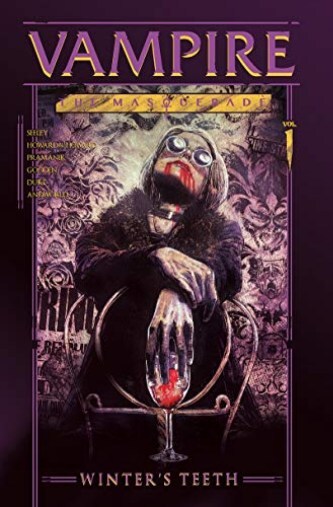 VAMPIRE: THE MASQUERADE: WINTER’S TEETH VOLUME 1 is a collection of the first five issues of the Vampire: The Masquerade comic book by Tim Seeley, Blake Howard, and Tini Howard. It is set in the World of Darkness universe, popularized by the Vampire: The Masquerade tabletop and video games. I’ve been reading every issue as they come out and think it would be inappropriate not to cover the graphic novel that was recently released. So, how is it?
VAMPIRE: THE MASQUERADE: WINTER’S TEETH VOLUME 1 is a collection of the first five issues of the Vampire: The Masquerade comic book by Tim Seeley, Blake Howard, and Tini Howard. It is set in the World of Darkness universe, popularized by the Vampire: The Masquerade tabletop and video games. I’ve been reading every issue as they come out and think it would be inappropriate not to cover the graphic novel that was recently released. So, how is it?
In general, Winter’s Teeth is a very solid and entertaining throwback to the Nineties Gothic Punk genre that eventually spawned things like Underworld as well as True Blood. It is a masqued world where the supernatural do their best to protect themselves from the prying eyes of mortals while carrying out sinister plots against, well, mostly each other. Vampires are fiercely competitive with one faction (The Camarilla) having a feudal structure and the other faction (The Anarchs) being, well, anarchic.
The comic is set within the Twin Cities of Saint Paul and Minneapolis. The cities have traditionally been considered separate domains but there’s movement to combine them under one single Prince who will rule them all. Completely uncaring about these politics is protagonist, Cecily Bain, who is a former Anarch who has allowed herself to become a traitor to the cause in order to look after her ailing geriatric sister. Nevetheless, the Brujah blood and her frustration leak out and sometimes drive her to astonishing acts of cruelty that alienate the few people who might otherwise be her allies. Indeed, the opening of the comic is Cecily murdering the mortal lover of a vampire in front of him even though she knows said lover would never betray the Masquerade.
What follows is a complicated and entertaining set of events that reminds me very much of my tabletop RPG sessions for reasons both good as well as bad. There’s a lot of really interesting storytelling going on but I also feel like the Storyteller (Tim Seeley in this case) occasionally throws in random crazy stuff to spice things up. At one point, a bunch of organ-harvesting cyborgs show up and I wondered if someone had been using their homebrew Mage/Vampire crossover material.
Cecily is a character that bounces between incredibly unlikable and entertaining in equal measures, which I think is the intent. She’s someone who has become jaded on the conflicts of Anarch vs. Camarilla and it has burned her out. Unfortunately, that means she’s unwittingly making enemies and does a few things that are just genuinely evil. Very true to the game but sometimes I felt like I wanted to see Cecily staked and left out for the sun. Despite my issues, I absolutely did love the Byzantine plots and betrayals that fill up the story. Cecily recruits a young fledgling in hopes of restoring some of her lost humanity but secretly having let a snake into her home. There’s a lot of humor to be had from the fact Cecily doesn’t know how to deal with someone from the modern world even though she was Embraced in the Eighties.
Really, I actually enjoyed the back-up stories a bit more than the main story and I didn’t dislike the main story. The Anarchs are a wonderful collection of oddballs and misfits trying to find their place in the world. Colleen is a fantastic Thin Blooded vampire (basically more human than monster) that is trying to serve as den mother to a bunch of dysfunctional monsters. I also am a big fan of King Rat, a Nosferatu Embraced in Vietnam who is older than all of them but just doesn’t want to get involved in their personal drama. His name is a James Clavell reference too and that’s rare enough in fiction.
The art is lovely with the fact that not everyone is generically cute or drop dead gorgeous. The covers are particularly eye-catching as is usual for the medium. No one is shown for pure fanservice but still appealing to look at. It helps with the sense of “realism” that the vampires could be met on the street versus being Anne Rice’s demigods. Hell, even Stephanie Meyer’s.
In conclusion, I really do recommend this book but with some caveats that a slower pace might have actually been better. I wanted to follow up Cordell’s vengeance scheme and get to know the Prince more. Vampire: The Masquerade is frequently about getting to know the major players of a single city. Even so, I very much enjoyed this and will be picking up the series as it continues on.

Buy from Amazon
VAMPIRE: THE MASQUERADE: WINTER’S TEETH VOLUME 1•VAMPIRE: THE MASQUERADE: WINTER’S TEETH VOLUME 1•VAMPIRE: THE MASQUERADE: WINTER’S TEETH VOLUME 1•VAMPIRE: THE MASQUERADE: WINTER’S TEETH VOLUME 1•VAMPIRE: THE MASQUERADE: WINTER’S TEETH VOLUME 1•VAMPIRE: THE MASQUERADE: WINTER’S TEETH VOLUME 1•VAMPIRE: THE MASQUERADE: WINTER’S TEETH VOLUME 1•VAMPIRE: THE MASQUERADE: WINTER’S TEETH VOLUME 1•
The post Review – VAMPIRE: THE MASQUERADE: WINTER’S TEETH VOLUME 1 by Tim Seeley, Blake Howard, Tini Howard, Nathan Gooden, Dev Pramanik, Addison Duke appeared first on BEFOREWEGOBLOG.
Self Published Fantasy to Add to You TBR Vol. 2
Volume 2 of wonderful self-published fantasy writers whose works would definitely enrich your TBR. We have a little bit of everything here, from grimdark-style fantasy to a game-related story. All of these stories would definitely make your afternoon much more exciting.
5 Self Published Fantasy Writers to Add to Your TBR

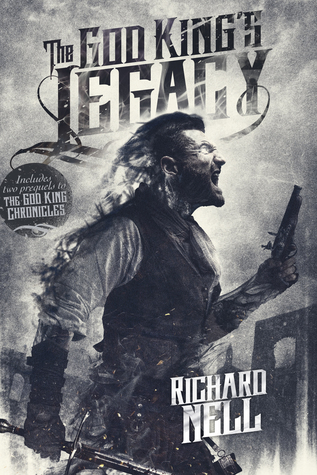
Author Richard NellThe God King's Legacy
God-king Marsun, the ‘Demon King’, has ruled for centuries. But nothing lasts forever.
Once just an illiterate tribal chief, Marsun trapped an ancient evil within his mighty soul, united scattered tribes in peace and prosperity, then retreated from the world. But his sacrifice is all but forgotten. Technology marches on; new ambitious powers rise; unhappy lords plot rebellion; and from every corner of civilization, savage enemies gather. The God King’s legacy has just begun…
From the author of Kings of Paradise comes two tales in a world of knights and demons, muskets and cannon fire. Flintlock fantasy mixed with the grit of Game of Thrones.
1) Rebellion of the Black Militia
Johann Planck, bastard and scribe of the god-king’s tower, is yanked from his peaceful life of academia, and ordered to capture an immortal creature of darkness. If the knight he’s accompanying doesn’t kill him, or the demon ‘Sazeal’, fresh rebellion just might.
2) Devil of the 22nd
A crumbling empire. An abandoned army. Kurt Val Clause is an ordinary soldier trying to keep it all together because no one else has the balls. Now he has one chance to win a glorious future, die in agony, or lose his soul. He just might do all three.
Buy from Amazon
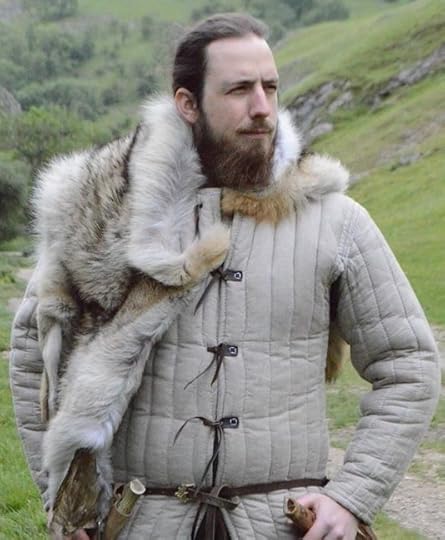
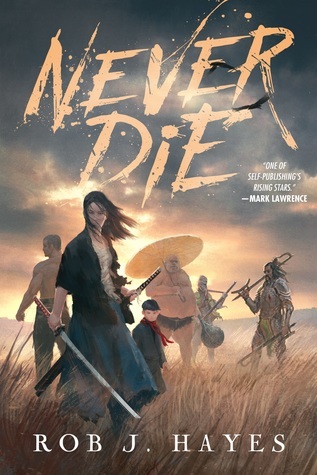
Author Rob HayesNever Die
The Mortal Techniques novels are a series of stand-alone stories that can be read entirely independently, set in the award-winning Mortal Techniques universe.
Samurai, shinigami, vengeful spirits, and an impossible quest.
The Emperor of Ten Kings has plunged Hosa into war, and the gods are angry.
When the god of death gives Ein a mission to kill the immortal emperor, he knows he can’t do it alone. He needs allies, heroes who will fight for him. How else can an eight-year-old boy hope to do the impossible?
Whispering Blade, Iron Gut Chen, the Century Blade, and Flaming Fist. These are all names of legend. And the god of death has given Ein a way to bind them to his cause. There is only one catch. In order to serve him, they must first die.
Never Die is a stand alone set in the world of Mortal Techniques. It’s a wuxia adventure filled with samurai, shinigami, heroes, and vengeful spirits.
Buy from Amazon

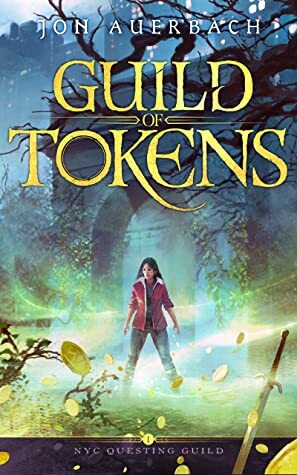
Author Jon Auerbachguild of Tokens
She wants to level up her humdrum existence. But her next quest could spell life or death.
All Jen Jacobs has achieved in life is loneliness. So when she stumbles across a real-life game of epic quests on the streets of New York, she jumps at the chance for some excitement and gold tokens. Little does she know that the items she strives to collect hold a darker purpose…
After a particularly harrowing quest pairs her up with Beatrice Taylor, a no-nonsense and ambitious mentor, Jen hopes she’s on the path to becoming a big-time player. But as she dives deeper into the game’s hidden agenda, she realizes Beatrice has her sights set on the Guild, the centuries-old organization that runs the Questing game. And the quests Jen loves are about to put both of them in grave danger.
Will Jen survive the game before powerful forces cut her real life short?
Guild of Tokens is a thrilling new twist on conventional urban fantasy. If you like determined heroines, gritty cityscapes, and vampire-free adventures, then you’ll love Jon Auerbach’s rollercoaster tale.
Buy from Amazon

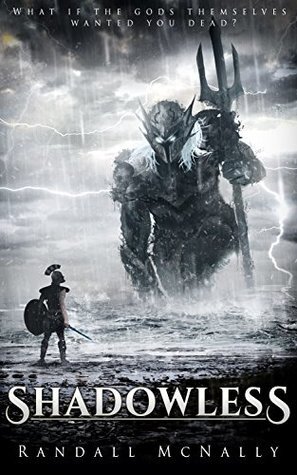
Author Randall McNallyShadowless
What if the gods themselves wanted you dead?
A young boy lies on a beach on a warm summer’s day. While trying to block the sun from his eyes Arpherius makes a shocking discovery; he has no shadow. Confused and bewildered he asks his uncle why he is shadowless. What he learns is a terrifying secret that will change his life forever.
Set in the Northern Realms, Shadowless is a fantasy novel about individuals born without a shadow. Spawned by the malevolent deities of this world these children of the gods are persecuted at every turn. Hunted by the high priests who carry out the wishes of their gods, hunted by the Shadow Watchers; armed soldiers who are assigned to each temple, and hunted by the gods themselves.
Part-mortal and part-god, the Shadowless live for centuries and face a battle for survival, constantly on the run or hiding in far-flung corners of the Northern Realms.
Soon their lives and fates become intertwined, expedited by the mysterious monk Amrodan. Driven by a series of visions Amrodan travels through the Northern Realms, seeking out the Shadowless and trying to enlist their help to take a stand and fight back against the gods.
Buy from Amazon

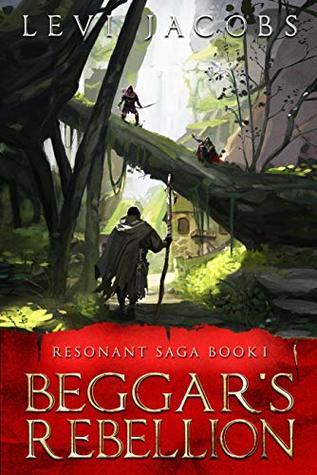
Author Levi JacobsBeggar's Rebellion
The Councilate controls everything except the truth. I have nothing save my discovery—but with this shall I destroy an empire.
Tai Kulga lost the rebellion and his best friend on the same day, stripping him of his will to live even as a strange power flooded his bones. When the friend returns as a spirit guide, it feels like a second chance—but his friend is not who he was, and the Councilate is not done oppressing his people. When trouble with lawkeepers lands Tai’s surviving friends in a prison camp, he must go underground to find the last of the rebels and convince them to break his friends free.
Along the way he meets Ellumia Aygla, runaway Councilate daughter posing as an accountant to escape her family and the avarice of the capital. Curious about the link between spirit guides and magic, her insights earn her a place among the rebels, and along with Tai’s power help turn the tide against the colonialists.
But as the rebels begin to repeat the Councilate’s mistakes, Tai and Ellumia must confront their own pasts and prejudices, before the brewing war turns them into the monsters they fight.
Buy from Amazon
The post Self Published Fantasy to Add to You TBR Vol. 2 appeared first on BEFOREWEGOBLOG.
July 25, 2022
The Books That Made Us: The Lion, the Witch, and the Wardrobe by C.S. Lewis
@
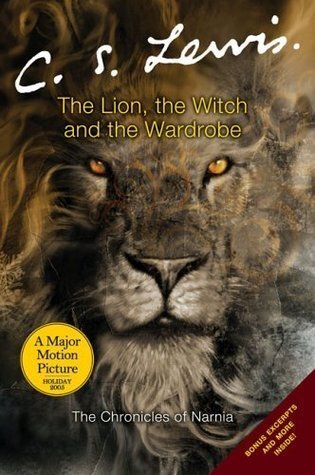 If you were to look at any of my socials (Insta, Youtube, Twitter etc.), you would see that I have a deep love for The Lord of the Rings by J.R.R Tolkien. You might assume from this that LOTR was my first foray into fantasy and was what offsetted my passion for the genre. However, you would be incorrect.
If you were to look at any of my socials (Insta, Youtube, Twitter etc.), you would see that I have a deep love for The Lord of the Rings by J.R.R Tolkien. You might assume from this that LOTR was my first foray into fantasy and was what offsetted my passion for the genre. However, you would be incorrect.
You see, it all started when I was in third grade and my teacher at the time gifted little me a book that she truly loved and hoped I would enjoy. A book that starts off with a little girl, a wardrobe, a snowy landscape, and a gentle faun named Tumnus.
Yes, my friends, I am talking about the magical story that is The Lion, the Witch, and the Wardrobe by C.S. Lewis. Looking back, I find it quite amusing how Tolkien and Lewis both criticized each others’ work heartily, and yet it was because of my love for The Lion, the witch, and the Wardrobe that I ended up falling in love with Lotr.
I’ve always been an avid reader, but prior to The Lion, the Witch and the Wardrobe i was mainly reading mysteries – things like The Hardy Boys, Nancy Drew, Cam Jensen etc. I wasn’t even aware of the fantasy genre in books until this book was placed in my hands by my beloved teacher. Immediately drawn in by the cover, I rushed home after school, flopped on my bed, and was instantly captivated and swept away into the land of Narnia.
I’m sure that most of you fantasy readers out there know the premise of this childhood classic, but for those who don’t, we essentially follow a little girl named Lucy who is the first to find a secret wardrobe when her and her three siblings are playing a rainy day game of hide and seek. Lucy chooses to hide in said wardrobe, and finds a magical world inside it. This is Narnia, where she is greeted by the faun Tumnus, and is led to his home. Enthralled by this fairy tale like world, Lucy tells her brothers and sister what happened. At first they don’t believe her, but soon Edmund, Peter, and Susan step through the wardrobe themselves. They discover that Narnia is a country buried under the evil enchantment of the White Witch. Upon meeting the great Lion Aslan, they are called to a great adventure and bravely join the battle to defend Narnia and defeat the evil White Witch.
When I read this for the first time, my little third grade brain was simply blown away with how utterly transportive and magical this world was. I felt like I was IN Narnia, that I was battling alongside the siblings. I felt the cold, I felt the fear, the frustration, the bravery, and the awe of each of the characters. It was exhilarating to say the least.
I skipped meals, stayed up until late at night, and spent every free moment at school simply devouring this book. I spent all my waking moments that I was not reading the book just daydreaming about it. To say I was hooked was an understatement.
This was my first on page experience of magical creatures and beings, like witches, talking animals, fauns,centaurs, trolls, giants, satyrs, dryads, etc. It was truly the best kind of escapism for me as a child and to this day I feel a sense of wonder whenever I think about that book.
One interesting tidbit I’d like to mention here – and something I only discovered as an adult – is that the Lion, the Witch, and the Wardrobe has a Christian allegory theme. There’s a ton of Christian symbolism in this book, and C.S. Lewis himself was a Christian. In fact, the ending of the novel focuses on the resurrection of a Christ figure and the climatic battle for the “soul” of Narnia. Lewis did not set out for this book to be a biblical allegory initially; he just wanted to create a magical fairy tale story with elements to the Biblical story of Jesus Christ for children to see the miraculous story in a new light.
When I found this out as an adult, I was simultaneously amused and impressed. Impressed by how seamlessly Lewis was able to fit that theme into his story without creating something that was overly preachy or uninteresting. I was amused because I was raised as a Christian and when I was younger, the church used to look down on fantasy as a whole and considered it blasphemy and demonic (I now attend a more progressive church that does not believe one’s soul is destined to Hell simply because they cracked open a Percy Jackson book, thank God). So it was refreshing to see that an actual Christian used the genre that the church feared and tried to paint as negative, to actually shine a light on the story of Jesus and His resurrection.
Well played, Mr. Lewis, well played.
At the end of the day, whether Christian or not, this book is absolutely magical and fantastical. It has changed my life and made me the avid fantasy reader that I am today, and it’s a book that I always recommend to beginner fantasy readers. Even years later it still holds up to its greatness, and there’s a valid reason as to why it’s highly acclaimed. I can’t wait for the day my son is old enough to read chapter books and I get to put the magical world of Narnia in his hands.
Actually, I might start reading it to him tonight. One can never be too young (or old for that matter) for magic.
“Once a King in Narnia, always a King in Narnia.”
Check Out Some of Our Other “Books That Made Us” PostsThe Books That Made Us Fear and Loathing in Las Vegas: A Savage Journey to the Heart of the American Dream by Hunter S. ThompsonBuy The Lion, The Witch, and the Wardrobe from Amazon
the lion, the witch, and the wardrobe•the lion, the witch, and the wardrobe•the lion, the witch, and the wardrobe•the lion, the witch, and the wardrobe•the lion, the witch, and the wardrobe•the lion, the witch, and the wardrobe•the lion, the witch, and the wardrobe•the lion, the witch, and the wardrobe•
The post The Books That Made Us: The Lion, the Witch, and the Wardrobe by C.S. Lewis appeared first on BEFOREWEGOBLOG.
5 Self Published Fantasy Writers to Add to Your TBR
There are a lot of wonderful fantasy writers in the world. Those that operate, write, and publish outside of traditional publishing. Self Published Fantasy Month and The Self Published Fantasy Blog off have drawn attention to an entire slew of amazing writers and stories worth checking out.


Author Patrick SamphireShadow of a Dead God
If Mennik Thorn had known the morning would end with him being framed for murder, he would have stayed trapped in the cupboard.
It was only supposed to be one little job – a simple curse-breaking for Mennik to pay back a favor to his oldest friend. But then it all blew up in his face. Now he is wanted for murder by the mage-killing Ash Guard, his best friend is about to be executed, and something monstrous is killing all the witnesses.
So how is a down-on-his-luck mage, broke, traumatized, and with a habit of annoying the wrong people, supposed to prove his innocence when everyone believes he’s guilty?
If he wants to get out of this, he is going to have to throw himself back into the corrupt world of the city’s high mages, a world he fled years ago.
Even that may not be enough, because a new, dark power is rising in Agatos, and all that stands in its way is one second-rate mage…
Third place in the Self-Published Fantasy Blog-Off 2020 (SPFBO6)
Finalist in the Book Bloggers’ Book of the Year Award (BBNYA) 2021
Shortlisted for the Booknest Fantasy Award Best Self-published Novel 2020
Buy from Amazon

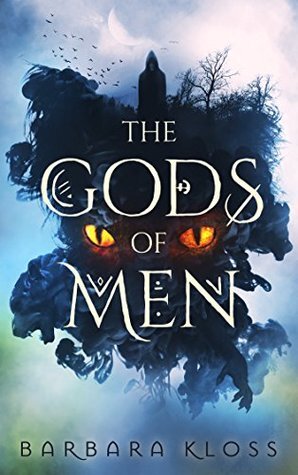
Author Barbara KlossThe Gods of Men
Top 10 Finalist in Mark Lawrence’s SPFBO 2018
Sable hated the gods. She hated what men did in their name.
Magic is forbidden throughout the Five Provinces; those born with it are hunted and killed. Sable doesn’t know her music holds power over souls—not until, at age nine, she plays her flute before the desert court and accidentally stops her baby sister’s heart, killing her. Horrified by what she’s done and fearing for her life, she flees north, out of Provincial jurisdiction and into the frigid land of exiles and thieves, known as The Wilds. There, Sable lives in hiding, burdened by guilt, and survives as a healer. But now, ten years later, someone—or something—is hunting her.
On the run again, Sable’s best chance for survival is Jos, a lethal man from the Five Provinces, who claims to need her skills as a healer to save his dying father, and she needs the large sum of money he’s offered. There’s something about him Sable doesn’t trust, but she doesn’t have many options. A spirit of the dead is hunting her, summoned by a mysterious necromancer, and it’s getting closer.
Sable soon discovers she’s just the start of the necromancer’s plan to take over the Five Provinces, and she’s the only one with the power to stop it. But harnessing her forbidden power means revealing it to the world, and the dangerous Provincial, Jos, she’s beginning to fall for.
Fans of Brandon Sanderson, Naomi Novik, and Victoria Schwab will love this dark and epic fantasy adventure.
Buy from Amazon

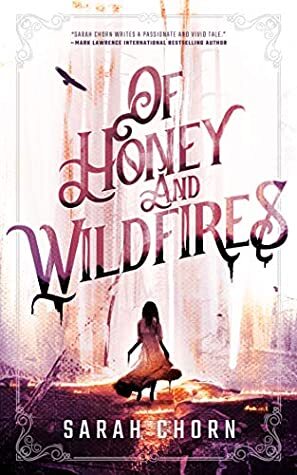
Author Sarah ChornOf Honey and Wildfires
From the moment the first settler dug a well and struck a lode of shine, the world changed. Now, everything revolves around that magical oil.
What began as a simple scouting expedition becomes a life-changing ordeal for Arlen Esco. The son of a powerful mogul, Arlen is kidnapped and forced to confront uncomfortable truths his father has kept hidden. In his hands lies a decision that will determine the fate of everyone he loves—and impact the lives of every person in Shine Territory.
The daughter of an infamous saboteur and outlaw, Cassandra has her own dangerous secrets to protect. When the lives of those she loves are threatened, she realizes that she is uniquely placed to change the balance of power in Shine Territory once and for all.
Secrets breed more secrets. Somehow, Arlen and Cassandra must find their own truths in the middle of a garden of lies.
Buy from Amazon
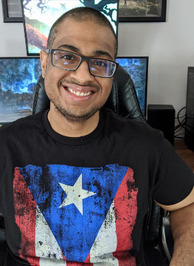
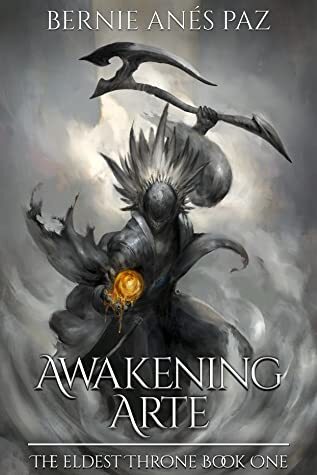
Author Bernie Anés PazAwakening Arte
Roun was born clanless, depriving him of a future in an empire where bloodlines and reputation mean everything. His only hope for escaping the life of an outcast lies in being awakened by the Eldest Throne and becoming a guardian of humanity.
But when his dream finally comes true, Roun finds himself stranded on the path to immortality with only a fragment of the spiritual powers he should have received. Roun, however, is used to making do with less—and will let neither rigorous training nor grotesque chimeras stand in the way of his ascension.
To find his own path, he will need to search for the answers hidden within. What he uncovers will forge him into a hero unlike any other—if it doesn’t leave him an abomination first.
Buy from Amazon
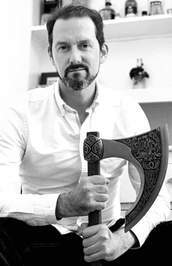
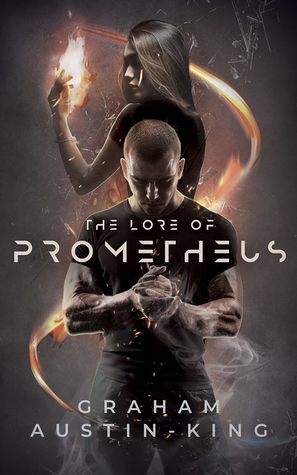
Author Graham Austin-KingLore of Prometheus
John Carver has three rules: Don’t drink in the daytime, don’t gamble when the luck has gone, and don’t talk to the dead people who come to visit.
It has been almost five years since the incident in Kabul. Since the magic stirred within him and the stories began. Fleeing the army, running from the whispers, the guilt, and the fear he was losing his mind, Carver fell into addiction, dragging himself through life one day at a time.
Desperation has pulled him back to Afghanistan, back to the heat, the dust, and the truth he worked so hard to avoid. But there are others, obsessed with power and forbidden magics, who will stop at nothing to learn the truth of his gifts. Abducted and chained, Carver must break more than his own rules if he is to harness this power and survive.
Buy from Amazon
The post 5 Self Published Fantasy Writers to Add to Your TBR appeared first on BEFOREWEGOBLOG.
July 24, 2022
Review – August Kitko and the Mechas from Space by Alex White
August Kitko and the Mechas from Space by Alex White is a kaleidoscope of a space opera story mixed with music notes and cinematic worldbuilding that takes the reader on a wild robot-fueled ride. If I had a visual comparison, think Speed Racer by the Wachowski sisters, mixed with Pacific Rim by Guillermo Del Toro. It is a whole vibe and one in which Alex White revels. You know they had to be cheering on the characters as they were writing this.
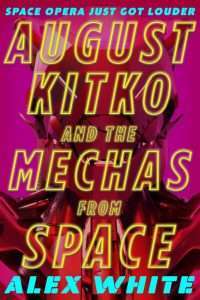 The plot starts with August Kitko staring at his demise on the cliff’s edge. August, Gus for short, is one of our protagonists, and he is a lover and player of jazz who truly feels music in his soul. But like his fellow humans, Gus has resigned himself to the fate of imminent death. He is at a party at the estate of Lord Elisa Yamazaki. The last party of humanity is a literal “eat, drink, and be merry for tomorrow we die” affair.
The plot starts with August Kitko staring at his demise on the cliff’s edge. August, Gus for short, is one of our protagonists, and he is a lover and player of jazz who truly feels music in his soul. But like his fellow humans, Gus has resigned himself to the fate of imminent death. He is at a party at the estate of Lord Elisa Yamazaki. The last party of humanity is a literal “eat, drink, and be merry for tomorrow we die” affair.
“These are Gods, and they speak with infinite choris.”
Humans are dying, not with a bang but with a single discordant note. An army of AI sentient Mechas from space are slowly destroying humanity by downloading each person’s consciousness and killing their bodies. Some of these killer robots break off, join the humans, and fight for humanity. The only caveat is that these robots need humans to pilot them, a prospect that would fundamentally change the human pilot forever.
Alongside Gus, we have our other protagonist Ardent Violet, a mega-pop star who shines with an inner light all their own. Again, in the same way music sings for Gus on his piano, music sings for Ardent on their guitar. Unlike Gus, Ardent is super famous. Both Gus and Ardent’s lives become intertwined. They have undeniable chemistry with one each other.
The Vanguard arrives on Earth in the form of a mecha named Juliette. A giant sleek purple robot set to start the maiming and destroying of bodies and reaping of consciousnesses. Then with an explosion of a “colorful Borealis of solar particles rippling across Earth’s atmosphere,” a sleek black Vanguard streaks across the sky. It is Greymalkin, the destroyer of seventeen worlds. The humans stare in stunned silence at the display of power, much like ants would stare in horror at an oncoming boot. The titans crash into each other in a thunderous cacophony. The Vanguards speak to each other in musical ululations, and above it all, Gus picks out F Dorian the favorite of jazz musicians everywhere.
Instead of gawking with the multitude of slack-jawed humans, Gus wants his true solace at the piano. “He taps the F-zero key, and it’s like heaven under his fingertips.” Gus lays in an effortless sound that “shifts modes to keep in sync with his new playmates,” the Vanguards crashing into each other outside. Gus dances over the sound of the robots outside as if they are playing for him. “If they want to end the world, fuck them. At least he can make it catchy.” Gus plays for the lost dead, his friends, his family, and the last vestiges of humanity.
Then ardent, whom he connected with earlier, comes in like a ray of sunshine; they brandish a red metal flake strat. And they prepare to play to the end of humanity until a black metal fist punches the wall in and grabs Gus.
One of the particular thrills of August Kitko and the Mechas from Space is the love of music and art. The story itself ebbs and flows like a symphony. I am not sure if that was a purposeful stroke by the author or me reading into it from being swept away by the descriptions of music. But the descriptions speak to the universal connections music gives us that are not bound by language or creed. Outside of the main characters, Gus and Ardent, the supporting characters we meet later in the novel also have a deep love for music, but with different instruments. I love that White is touching on how music is culturally boundless.
If you have giant robots, we have to talk about the fights. Firstly, we get descriptions of every Vanguard that comes in swinging. The descriptions and names are fantastic because it is akin to cheering the home team on. You have a much greater connection to these giants than them being a nameless horde. Every punch and kick is choreographed to have the most effective mental image. The swings are enormous, the slams are massive, and machine parts fly. In the belly of the gigantic beasts are pilots controlling it all.
Why does this story work? I think in lesser hands, this story could be a mess. There are a lot of working pieces. However, White helps us keep our eye on the ball. We care about the protagonists, probably more so than the fate of humanity in general. Gus and Ardent are not perfect in any way. Ardent can be narcicistic, and Gus can be melodramatic. But both characters rise above through pain, terror, failure, and heroism. They reach inside themselves to be more than they ever thought possible. Someone has to step up and do it, so why not them?
Is this book for everyone? Absolutely not. As I said earlier, this book is a beautiful kaleidoscope—a crazy fast, moving, loud story with brilliant lights and massive highs and lows. It isn’t for someone who enjoys subtle prose. It is intense from the first page to the last. So if you enjoy stories like Nophek Gloss by Essa Hansen and Far From the Light of Heaven by Tade Thompson, this story is for you.
The original review appeared hereBuy August Kitko and the Mechas from Space by Alex White from Amazon
August Kitko and the Mechas from Space by Alex White•August Kitko and the Mechas from Space by Alex White•August Kitko and the Mechas from Space by Alex White•August Kitko and the Mechas from Space by Alex White•August Kitko and the Mechas from Space by Alex White•August Kitko and the Mechas from Space by Alex White•August Kitko and the Mechas from Space by Alex White•August Kitko and the Mechas from Space by Alex White•
The post Review – August Kitko and the Mechas from Space by Alex White appeared first on BEFOREWEGOBLOG.
July 22, 2022
Review – Super Powereds Year One by Drew Hayes
 SUPER POWEREDS: YEAR ONE is the first volume of Drew Hayes’ SUPERPOWERED’s series. I was a already a fan of the man due to his FRED: THE VAMPIRE ACCOUNTANT and VILLAINS’ CODE series. So, I had no doubt I was going to love this book. What were my feelings upon finishing the first book? I definitely enjoyed it with a few small caveats.
SUPER POWEREDS: YEAR ONE is the first volume of Drew Hayes’ SUPERPOWERED’s series. I was a already a fan of the man due to his FRED: THE VAMPIRE ACCOUNTANT and VILLAINS’ CODE series. So, I had no doubt I was going to love this book. What were my feelings upon finishing the first book? I definitely enjoyed it with a few small caveats.
The premise is that the world is full of mutants (called “Supers”) that are born with special abilities like the ability to fly, turn into steel, or shoot laser beams out of their eyes. However, like the aforementioned Marvel creatures, they also have a downside where there are people crippled by their abilities. These people (called “Powereds”) are unable to control their power and are despised by the public.
A group of these Powereds are gathered together and operated on by a mysterious group that then enrolls them in Lander University. They have been turned into Supers by their surgeries and it is a test to see if they can pass the punishing trials that others undergo in order to become full-fledged superheroes. It’s somewhat similar to MY HERO ACADEMIA except the protagonists are malfunctioning Supers instead of a “normal” person who gains superpowers.
The protagonists are an eclectic mix of a telepath, a luck-manipulator, an energy absorber, a kid who has a sexy Captain Marvel-esque alter ego, and a flying heiress. They are just part of a much larger campus full of Supers that are all competitng to become the next generation of superheroes. The weight of the secret they hold could change their positions considerably, though.
Part of what I like about the book is how authentic it feels. The majority of the characters are dealing less with issues of superpowers than they are things like romance, being on their own for the first time, and other classic elements of real life. It actually feels a lot more authentic to the college experience as I remember it versus the way its often portrayed on television or in books.
Much of the book’s appeal is the fact that it feels relatively low stakes and that helps make the storyline easier to indulge in. Who is sleeping with who and whether a character is pushing his limits or not isn’t the kind of thing you can focus on while doing the usual superhero thing. There’s room to breathe and enjoy the minutia of college life as defined by people who think they’re a Jedi or can use their replication power for threesomes. There’s still action scenes and a plot by the end but they’re mostly in the name of friendly training.
The book can best be summarized as “relaxing” and an entertaining read versus something that is especially deep in its world-building. That isn’t necessarily a bad thing because it is a world that is easily understood and serves as a springboard for getting to know its likable and entertaining cast. It’s long enough that I wouldn’t say it’s afternoon reading but an enjoyable week’s read when you just want to be entertained.
This was originally a web novel, and I will state the Kindle edition I got had some minor formatting issues. I didn’t have difficulty reading it, and there were only a couple of minor errors. Still, having experienced the book in both Audible and Kindle formats, I would recommend the former. If you like superheroes and you like coming-of-age dramas then this is definitely for you.
Buy from Amazon
SUPER POWEREDS YEAR ONE•SUPER POWEREDS YEAR ONE•SUPER POWEREDS YEAR ONE•SUPER POWEREDS YEAR ONE•SUPER POWEREDS YEAR ONE•SUPER POWEREDS YEAR ONE•SUPER POWEREDS YEAR ONE•SUPER POWEREDS YEAR ONE•
The post Review – Super Powereds Year One by Drew Hayes appeared first on BEFOREWEGOBLOG.
Review – The Acktus Trials by D.T. Kane
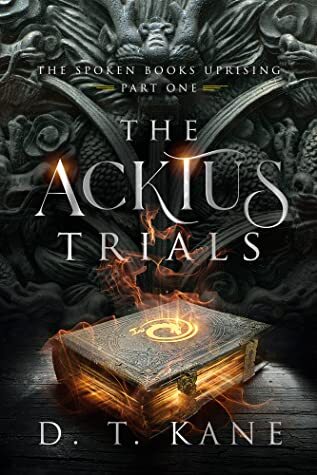 Recently I made a video on my channel about some SPFBO books that I’m excited to read this year, and The Acktus Trials by D.T. Kane was one of the books that made the list. When I first read the synopsis, I was immediately intrigued by the concept. As a book lover, what’s better than a book all about books? Add in a fantasy setting and dragons, and it’s just the perfect recipe for a good book to me.
Recently I made a video on my channel about some SPFBO books that I’m excited to read this year, and The Acktus Trials by D.T. Kane was one of the books that made the list. When I first read the synopsis, I was immediately intrigued by the concept. As a book lover, what’s better than a book all about books? Add in a fantasy setting and dragons, and it’s just the perfect recipe for a good book to me.One of the things that truly stood out to me while reading this book was D.T. Kane’s ease with worldbuilding. There was so much lore and expansiveness, but at the same time it was explained in a way that didn’t feel overly complicated or info dumpy at all. I enjoyed learning about the caste system when it came to Speakers, Readers, Harbors, and Illits. I have never read a book with this kind of unique magic system, and I was highly invested.
The plot and pacing was also superbly well done, and unfolded in such an organic way. There was never a dull moment, and I felt like I was on the edge of my seat with every plot point that we encountered.
The character work was also well done. Each of our characters are in different caste systems -we have a Speaker, a Reader, and a Harbor. In this world, Readers are regarded as superior to everyone else, as they are the only one allowed to learn how to Read from Books. Speakers are only allowed to recite Spells that are Read to them from these Books by Speakers. They are immediately told a Stop Rune, that prevents them from memorizing any Spells they recite. Harbors are essentially the armed henchmen who are tasked with protecting Readers.
So we have Baz who is a Speaker (and the main character of our story), Deliritous who is a Reader, and Rox who is a Harbor. They are sent to participate in The Acktus Trials, where they have to procure a Book from the destroyed and abandoned city of Tome.
As we travel with these characters, we get to witness them slowly but surely learn to trust and work together, and we see the internal struggle of each character as they try to unlearn what they were always taught.
I feel like the character development was done in such a way that felt natural, and made sense for each character. They don’t all come to the same conclusion or change their mindset completely; it’s definitely a work in progress.
Overall, I felt that this was such an entertaining and unique story. I absolutely loved my time reading this book! Baz and Rox are some of my new favorite characters and my bookworm heart absolutely thrived with the concept of Book Dragons.
For the first book in an (apparently 12-book) series, this was definitely solid and I look forward to continuing on.
*This review is separate from the SPFBO8 contest
Buy The Actus Trials from Amazon
THE ACTUS TRIALS•THE ACTUS TRIALS•THE ACTUS TRIALS•THE ACTUS TRIALS•THE ACTUS TRIALS•THE ACTUS TRIALS•THE ACTUS TRIALS•THE ACTUS TRIALS•
The post Review – The Acktus Trials by D.T. Kane appeared first on BEFOREWEGOBLOG.
July 21, 2022
#SPFBO8 Review and Cut – Honor For The Dead by Connor Ludovissy

With his rifle, cunning, and a little bit of runic magic, Ao will do whatever it takes to save his home. No matter who has to bleed for it.
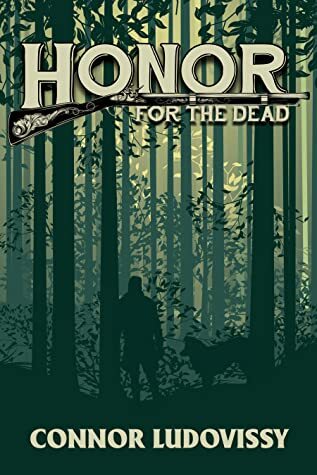 What it is Honor for the Dead About:
What it is Honor for the Dead About:Ao has always tried to do the right thing. So when Renfreya was attacked by the bloodthirsty Kings, he volunteered for the army. Now he has blood on his hands, his own comrades are hunting him, and the right thing to do isn’t so clear anymore.
Renfreya and the Kings have fought each other to a bloody stalemate on the Plain of the Ancestors, and no one knows who will emerge the victor. No one but Ao.
When an easy first mission turns into a massacre, Ao uncovers a secret that could turn the tide of the war and save his home. But with a power-hungry sergeant leading the company and a horde of killers opposing them, he might never get the chance. Not unless he creates it himself.
With his rifle, cunning, and a little bit of runic magic, Ao will do whatever it takes to save his home. No matter who has to bleed for it.
My Review of Honor for the Dead:Ao joined the Army, although his grandfather tried to talk him out of it. He wanted to be honorable, do the right thing. And of course, with the cowardice of his grandfather still remembered, it might bring some decency back to his family name.
When things quickly go wrong, Ao knows that what they are doing is wrong. They are no longer soldiers, out for glory. They are murderers, and they are going to have to pay for what they did.
He is determined to do the right thing, even if it means deserting the Army…
When I was reading through Honor For The Dead, it was a pretty decent read. I enjoyed aspects of it, while others felt as though it bogged down a little bit. In my humble opinion, a good editor could do a lot of good for this novel, as I found several typos, and some areas where sentences didn’t read as clearly as they could. I read the majority of this novel, and while it flows, there are some areas where hiccups are visible, breaking the flow of the novel.
While this is a cut, this author has a lot of potential, and I look forward to seeing more from him!
Check Out Some of Our Other Posts#SPFBO8 Review and Cut – The Burnt Watcher by Keith Healing
#SPFBO8 – Review and Cut -Debunked by Dito Abbott
Buy from Amazon
HONOR FOR THE DEAD•HONOR FOR THE DEAD•HONOR FOR THE DEAD•HONOR FOR THE DEAD•HONOR FOR THE DEAD•HONOR FOR THE DEAD•HONOR FOR THE DEAD•HONOR FOR THE DEAD•
The post #SPFBO8 Review and Cut – Honor For The Dead by Connor Ludovissy appeared first on BEFOREWEGOBLOG.
Review – Binti by Nnedi Okorafor

“They say that when faced with a fight you cannot win, you can never predict what you will do next. But I’d always known I’d fight until I was killed.”
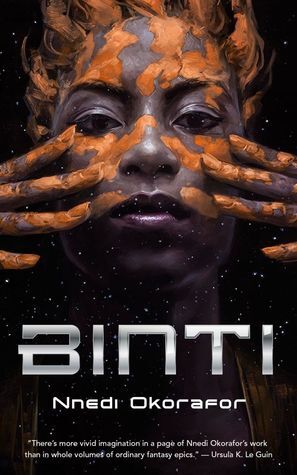 From the publisher, “Her name is Binti, and she is the first of the Himba people ever to be offered a place at Oomza University, the finest institution of higher learning in the galaxy. But to accept the offer will mean giving up her place in her family to travel between the stars among strangers who do not share her ways or respect her customs.
From the publisher, “Her name is Binti, and she is the first of the Himba people ever to be offered a place at Oomza University, the finest institution of higher learning in the galaxy. But to accept the offer will mean giving up her place in her family to travel between the stars among strangers who do not share her ways or respect her customs.
Knowledge comes at a cost, one that Binti is willing to pay, but her journey will not be easy. The world she seeks to enter has long warred with the Meduse, an alien race that has become the stuff of nightmares. Oomza University has wronged the Meduse, and Binti’s stellar travel will bring her within their deadly reach.
If Binti hopes to survive the legacy of a war not of her making, she will need both the gifts of her people and the wisdom enshrined within the University itself – but first, she has to make it there, alive.”
“We prefer to explore the
universe by traveling
inward, as opposed to
outward.”
– excerpt from Nnedi Okorafor’s Binti
Where have I been? Apparently, under a rock, because there is a bit of a Nnedi-renaissance going on. Her work, whether a short story, novella, or full-length novel, is everywhere and very well respected in the science fiction/fantasy community.
This story is pretty straightforward. A fish out of water tale. However, what is not straightforward is the depth of character that Okorafor created in such a short novella.
Binti is a 16-year-old girl from the isolated Himba region on Earth. She applies and is accepted into the prestigious intergalactic university Oomza Uni, and is the first person of Himba descent to ever be admitted, let alone attend the prestigious school. Right away, we, as a reader, know that Binti is stepping way out of her comfort zone, both culturally, physically, and emotionally. Her people are very traditional and are not one to reach out to change. This in itself is a huge internal conflict for Binti that is artfully addressed throughout the story.
While in transit, Binti’s ship is attacked and hijacked by the warlike Medusae people. A jellyfish-like species that has been at war with the Khoush, aka other earthlings. The entirety of the ship’s inhabitants, save for Binti and the pilot, is murdered with little regard. To escape, Binti retreats to her personal living quarters, after which she attempts to wait out the trip to make it to Oomza Uni alive.
“I swiped otjize from my forehead with my index finger and knelt down. Then I touched the finger to the sand, grounding the sweet-smelling red clay into it. “Thank you,” I whispered.”
– excerpt from Nnedi Okorafor’s Binti
In the process of trying to survive, Binti makes some startingly discoveries. First, the piece of technology that she brought from earth, called an edan, enables Binti to communicate with the Medusae. Something that had previously not been accomplished. Secondly, the red clay-like substance that Binti uses from her homeland called otijza has healing properties for the Medusae.
Without giving too much away, Binti uses her empathetic nature to work with both the Oomza Uni and Medusae. That is the end of this particular novella, but not the story. Okarafor has gone on to write two additional novellas that flesh out Binti’s character even further.
“Tribal”: that’s what they
called humans from ethnic groups too
remote and “uncivilized” to regularly
send students to attend Oomza Uni.”
– excerpt from Nnedi Okorafor’s Binti
First, let’s address some of the high points of the story and writing style. Nnedi Okorafor is an authentic writer. In that, I mean she feels entirely at home within the prose of her words, and it reads comfortably. There are no forced situations or scenarios; every scene flows smoothly and transitions from one scene to the next. This is a rare trait in a writer, especially at a short story or novella-length, when much has to happen in a short period. Okorafor is an author that shows instead of tells. The technology that she has created naturally doesn’t exist, and its use in the story is a huge and essential plot point. Instead of saying that Binti’s edan does this and that, Okanfur shows us. Lastly, I feel like I know Binti. Okorafor has described Binti so vibrantly that I feel like I could hold her braids in my hand, smell the red clay she coats her body with, and the electrical currents she can harmonize. Oddly enough, it has little to do with how tall Binti is or other physical features and entirely on the content of Binti’s character, quality of writing, and a feel for her as a person.
At the end of this novella, we learn that knowledge comes with a significant cost, a cost that Binti has to pay. The ending is both bittersweet, a punch in the proverbial gut, and an opportunity for her to become more. Well worth the read. Not only is this a feather in the cap of Africanfuturism, but of science fiction at large. This is a damn good story.
Check Out Some of My Other ReviewsReview – Blackbirds by Chuck Wendig
Review – The Monster of Elendhaven by Jennifer Giesbrecht
Buy from Amazon
BINTI•
BINTI•
BINTI•
BINTI•
BINTI•
BINTI•
BINTI•
BINTI•
The post Review – Binti by Nnedi Okorafor appeared first on BEFOREWEGOBLOG.
Review – Bones of the Past by Drew Hayes
 BONES OF THE PAST is the sequel to FORGING HEPHAESTUS by Drew Hayes as well as the second volume of the VILLAIN’S CODE series. I happen to have read this as the first of Drew Hayes’ superhero novels and really need to get around to reading the others. However, I will admit a certain bias to this novel. I, too, write “villain” books, particularly superhero books and this is straight up my jam. The previous book was a big meaty volume that really got into the day-to-day lives of supervillains and heroes both.
BONES OF THE PAST is the sequel to FORGING HEPHAESTUS by Drew Hayes as well as the second volume of the VILLAIN’S CODE series. I happen to have read this as the first of Drew Hayes’ superhero novels and really need to get around to reading the others. However, I will admit a certain bias to this novel. I, too, write “villain” books, particularly superhero books and this is straight up my jam. The previous book was a big meaty volume that really got into the day-to-day lives of supervillains and heroes both.
The premise is that the events of the previous book have seriously shaken up the status quo in the universe. The Guild of Villainous Reformation has been exposed as existing and this has dramatically reduced their power base. They thrived in the shadows with minimal superhero interference and with the threat of their power being kept nebulous. The Alliance of Heroic Champions has also suffered due to the discovery it had made a compromise with the world’s villains and also was responsible for the massive fight that almost destroyed Ridge City.
The two main characters of the book are Tori Rivas (Hephaestus) and Ivan Gerhardt (Fornax). Tori is a science hero similar to a young Tony Stark or Riri Williams (Ironheart). Not particularly villainous but not very heroic either, Tori looks up to Ivan for guidance. Ivan is as about as thoroughly redeemed a villain as possible without giving up his edge. Ivan wants nothing more than a life of safety for his children but believes that occasionally tearing apart some people is the best way to do that. It’s an argument that Tori feels is right when a villain attempts to endanger Ivan’s children at the equivalent of the Girl Scouts.
Contrasting our antiheroes are the New Science Sentries that are a team of heavily-trained science heroes that are the prodigies of Professor Quantum. They’re not very good at this job, having been forced into the mold of heroes by a less-than-noble man. Nevertheless, they try and become better heroes and it is hilarious when they move into Tori’s building like something that would happen to Peter Parker during the Sixties.
Much of the book deals with the theme of how much fear is needed as a contrast to hope among retributive justice. Lodestar is someone that inspires people to be their best selves but the fear of the Guild proves just as large an incentive for criminals to keep civilians out of the line of fire. We also see how the carrot and the stick applies to Earth’s handling of alien invaders. Lodestar wants to peacefully deal with alien cultures while Ivan wants to make an example of anyone who might threaten the people of Earth.
There’s the slight problem that the villains really don’t seem to do anything villainous. I expected a bit more theft and money-laundering other than murdering people who really-really deserve it but I’m okay with this. Much of the book’s premise depends on the fact that the majority of villains have discovered its much better to make money in secrecy than take over the world. Indeed, Doctor Mechanical is pretty much Lex Luthor if he didn’t have his overwhelming obsession with destroying Superman. He’s content being the world’s richest man and controlling the world from behind the scenes.
This is another solid and entertaining book by Drew Hayes. I really got to experience life among his fascinating characters and felt he’s made a full on DC or Marvel Universe equivalent. It’s really a fun slice of life series with aliens, robots, and archvillains. I also feel like I’d read this as a regular comic book in real life.
Buy from Amazon
BONES OF THE PAST•BONES OF THE PAST•BONES OF THE PAST•BONES OF THE PAST•BONES OF THE PAST•BONES OF THE PAST•BONES OF THE PAST•BONES OF THE PAST•
The post Review – Bones of the Past by Drew Hayes appeared first on BEFOREWEGOBLOG.



